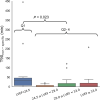Hypoxaemic burden in heart failure patients receiving adaptive servo-ventilation
- PMID: 37794711
- PMCID: PMC10682887
- DOI: 10.1002/ehf2.14556
Hypoxaemic burden in heart failure patients receiving adaptive servo-ventilation
Abstract
Aims: This study aimed to assess the effectiveness of adaptive servo-ventilation (ASV) for lowering hypoxaemic burden components in heart failure with reduced ejection fraction (HFrEF) patients.
Methods and results: Fifty-six stable HFrEF patients with left ventricular ejection fraction ≤ 40 were randomized to receive either ASV (n = 27; 25 males) or optimal medical management or optimal medical management alone (n = 29; 26 males). Patients underwent overnight polysomnography at baseline and a 12 week follow-up visit. We quantified hypoxaemic as time spent at <90% oxygen saturation (T90) decomposed into desaturation-related components (T90desaturation ) and non-specific drifts (T90non-specific ). In the ASV arm, T90 significantly shortened by nearly 60% from 50.1 ± 95.8 min at baseline to 20.5 ± 33.0 min at follow-up compared with 59.6 ± 88 and 65.4 ± 89.6 min in the control arm (P = 0.009). ASV reduced the apnoea-related component (T90desaturation ) from 37.7 ± 54.5 to 2.1 ± 7.3 min vs. 37.7 ± 54.5 and 40.4 ± 66.4 min in the control arm (P = 0.008). A significant non-specific T90 component of 19.6 ± 31.8 min persisted during ASV. In adjusted multivariable regression, T90desaturation was significantly associated with the ratio of the forced expiratory volume in the first second to the forced vital capacity of the lungs (β = 0.336, 95% confidence interval 0.080 to 0.593; P = 0.011) and T90non-specific with left ventricular ejection fraction (β = -0.345, 95% confidence interval -0.616 to -0.073; P = 0.014).
Conclusions: ASV effectively suppresses the sleep apnoea-related component of hypoxaemic burden in HFrEF patients. A significant hypoxaemic burden not directly attributable to sleep apnoea but related to the severity of heart failure remains and may adversely affect cardiovascular long-term outcomes.
Keywords: Adaptive servo-ventilation; Heart failure with sleep apnoea; Randomized controlled trial.
© 2023 The Authors. ESC Heart Failure published by John Wiley & Sons Ltd on behalf of European Society of Cardiology.
Conflict of interest statement
None declared.
Figures


Similar articles
-
Design of the effect of adaptive servo-ventilation on survival and cardiovascular hospital admissions in patients with heart failure and sleep apnoea: the ADVENT-HF trial.Eur J Heart Fail. 2017 Apr;19(4):579-587. doi: 10.1002/ejhf.790. Eur J Heart Fail. 2017. PMID: 28371141 Clinical Trial.
-
Adaptive servo-ventilation for sleep-disordered breathing in patients with heart failure with reduced ejection fraction (ADVENT-HF): a multicentre, multinational, parallel-group, open-label, phase 3 randomised controlled trial.Lancet Respir Med. 2024 Feb;12(2):153-166. doi: 10.1016/S2213-2600(23)00374-0. Epub 2023 Dec 21. Lancet Respir Med. 2024. PMID: 38142697 Clinical Trial.
-
Nocturnal hypoxemic burden during positive airway pressure treatment across different central sleep apnea etiologies.Sleep Med. 2021 Mar;79:62-70. doi: 10.1016/j.sleep.2021.01.007. Epub 2021 Jan 5. Sleep Med. 2021. PMID: 33482454
-
Use of adaptive servo ventilation therapy as treatment of sleep-disordered breathing and heart failure: a systematic review and meta-analysis.Sleep Breath. 2020 Mar;24(1):49-63. doi: 10.1007/s11325-019-01882-8. Epub 2019 Jul 3. Sleep Breath. 2020. PMID: 31270726
-
Adaptive servoventilation improves cardiac dysfunction and prognosis in heart failure patients with sleep-disordered breathing: a meta-analysis.Clin Respir J. 2017 Sep;11(5):547-557. doi: 10.1111/crj.12390. Epub 2015 Oct 22. Clin Respir J. 2017. PMID: 26403758 Review.
References
Publication types
MeSH terms
Grants and funding
LinkOut - more resources
Full Text Sources
Medical

